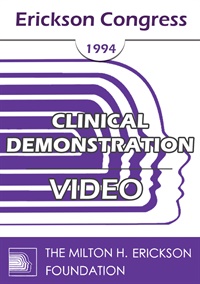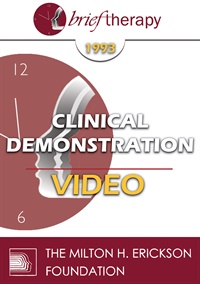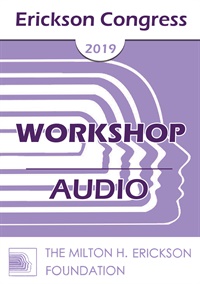
- Average Rating:
- Not yet rated
- Topic Areas:
- Workshops | LGBTQ | Multicultural | Strengths-Based | Ericksonian Hypnosis and Therapy Techniques
- Categories:
- Erickson Congress | Erickson Congress 2019
- Faculty:
- Rick Miller, MSW
- Duration:
- 1 Hour 51 Minutes
- Format:
- Audio Only
- Original Program Date:
- Dec 15, 2019
- Short Description:
- The emotional mystique between gay sons and their mothers has long been unexplored, but now new evidence suggests that a mother’s response to her son’s sexuality isn’t the only factor in his future success. How she nurtures him based on his interests, rather than his sexual preferences, is key, especially in a society with narrow definitions of masculinity.
- Price:
- $15.00 - Base Price
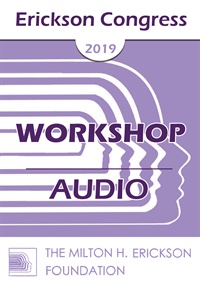
- Average Rating:
- Not yet rated
- Topic Areas:
- Workshops | Multicultural | Strategic Therapy | Strengths-Based
- Categories:
- Erickson Congress | Erickson Congress 2019
- Faculty:
- Terry Soo-Hoo, PhD
- Duration:
- 2 Hours 3 Minutes
- Format:
- Audio Only
- Original Program Date:
- Dec 15, 2019
- Short Description:
- Much of this Workshop will address issues of culture, race, sexual orientation, diversity and social justice and equality, etc. A major premise is the idea that all therapy is multicultural therapy. This means that every client brings to therapy a unique world and therefore the challenge for every therapy is for the therapist to be able to enter the unique world of each client. This therapy method is especially adept at working with cultural differences as it is highly adaptable and therefore able to work within the unique world of the client.
- Price:
- $15.00 - Base Price
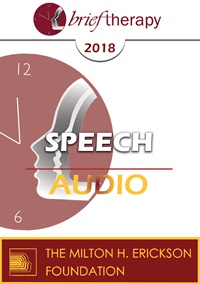
- Average Rating:
- Not yet rated
- Topic Areas:
- Speeches | Multicultural | Strategic Therapy | Brief Therapy | Strengths-Based
- Categories:
- Brief Therapy Conference | Brief Therapy Conference 2018
- Faculty:
- Terry Soo-Hoo, PhD
- Duration:
- 1:42:11
- Format:
- Audio Only
- Original Program Date:
- Dec 09, 2018
- Short Description:
- The Culturally Sensitive Strength-Based Strategic Therapy method was developed to integrate various principles founded by the Mental Research Institute (MRI) and Jay Haley’s Strategic Therapy approach as well as other methods to address these issues. In this workshop, guidelines will be presented for learning the principles of Culturally Sensitive Strength-Based Strategic Therapy. There will be an emphasis on effective strategies in working within the cultural context of the client and how this is critical to successful therapy. A structure will be presented for organizing the specific tasks and skills involved in different aspects of the method including activating the client’s strengths. Case examples, some on video recordings, will illustrate many innovative brief therapy techniques.
- Price:
- $15.00 - Base Price
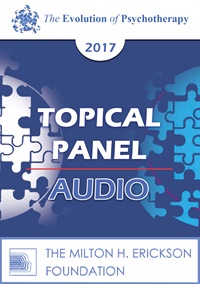
- Average Rating:
- Not yet rated
- Topic Areas:
- Topical Panels | Depression
- Categories:
- Evolution of Psychotherapy | Evolution of Psychotherapy 2017 | Pioneers in Couples and Family Therapy
- Faculty:
- Michele Weiner-Davis, LCSW | Michael Yapko, PhD | Jeffrey Zeig, PhD
- Duration:
- 1:04:08
- Format:
- Audio Only
- Original Program Date:
- Dec 15, 2017
- Short Description:
- This panel explores fresh ways of understanding and treating depression, moving beyond rigid diagnoses toward a more experiential, state-based approach. The conversation blends clinical strategy with personal story, underscoring the power of connection, early intervention, and skill-building. Biological treatments are considered, but the heart of the work lies in thoughtful, attuned therapeutic relationships.
- Price:
- $15.00 - Base Price

- Average Rating:
- Not yet rated
- Topic Areas:
- Short Courses | Attachment | Ericksonian Hypnosis and Therapy Techniques | Family Therapy | Blended Families
- Categories:
- Brief Therapy Conference | Brief Therapy Conference 2012
- Faculty:
- Dale Bertram, PhD | Mike Rankin, MA
- Duration:
- 1:23:09
- Format:
- Audio Only
- Original Program Date:
- Dec 09, 2012
- Short Description:
- Blending stepfamilies takes more than rules and structure. In this thoughtful and story-rich session, Bertram and Rankin explore how Ericksonian principles such as utilization, reframing, cooperation, and working with resistance can help families shift perspective and build secure attachment. Through clinical examples and dialogue, they show how honoring loyalty binds, slowing the process, and strengthening the couple bond can transform conflict into connection and help stepfamilies become true communities.
- Price:
- $15.00 - Base Price
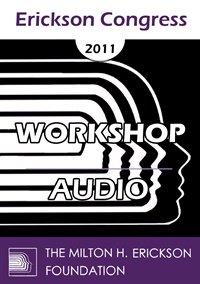
- Average Rating:
- Not yet rated
- Topic Areas:
- Happiness | Workshops | Positive Psychology | Ericksonian Hypnosis and Therapy Techniques
- Categories:
- Erickson Congress | Erickson Congress 2011
- Faculty:
- George Burns, MA, PsS
- Duration:
- 1 hour
- Format:
- Audio Only
- Original Program Date:
- Dec 07, 2011
- Short Description:
- Burns explores how positive psychology and Ericksonian thinking shift therapy from symptom relief to the active cultivation of happiness. Through research findings, case examples, live demonstration, and experiential exercises, he shows how therapists can help clients clarify meaningful goals, build gratitude and mindfulness practices, engage nature, and strengthen personal agency. The result is a practical framework for moving beyond “back to baseline” toward enhanced well-being and resilience.
- Price:
- $20.00 - Base Price
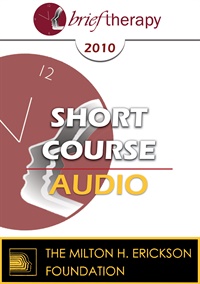
- Average Rating:
- Not yet rated
- Topic Areas:
- Family Therapy | Short Courses | Children and Adolescent Therapy | Brief Therapy | Strengths-Based
- Categories:
- Brief Therapy Conference | Brief Therapy Conference 2010
- Faculty:
- Bob Bertolino, PhD
- Duration:
- 1:31:15
- Format:
- Audio Only
- Original Program Date:
- Dec 09, 2010
- Short Description:
- Agencies are under pressure to prove outcomes, yet real change still hinges on human connection. In this practical session, Bertolino integrates strength-based practice, client feedback, and research on therapist effects to show how services can become both more accountable and more effective. Drawing from real agency data, he demonstrates how tracking progress, focusing on client strengths, and refining clinician skill can reduce dropout and improve results without sacrificing the heart of the work.
- Price:
- $15.00 - Base Price
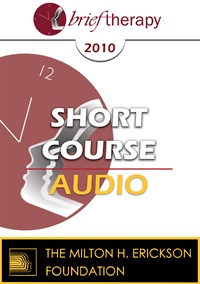
- Average Rating:
- Not yet rated
- Topic Areas:
- Psychotherapy | Short Courses | Strengths-Based
- Categories:
- Brief Therapy Conference | Brief Therapy Conference 2010
- Faculty:
- Steven Kuester
- Duration:
- 1:26:11
- Format:
- Audio Only
- Original Program Date:
- Dec 09, 2010
- Short Description:
- This workshop is designed to examine certain assumptions of traditional psychotherapies and to provide the participant with a powerful exposure to strength-based treatment. At the conclusion of the session, participants will have gained knowledge and expertise about incongruency versus congruency as a core component of successful treatment outcomes and the therapeutic relationship. With Steven Kuester.
- Price:
- $15.00 - Base Price
Tags: Psychotherapy Strengths-Based
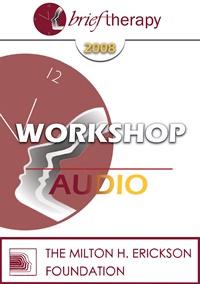
- Average Rating:
- Not yet rated
- Topic Areas:
- Workshops | Children and Adolescent Therapy | Family Therapy | Brief Therapy | Strengths-Based
- Categories:
- Brief Therapy Conference | Brief Therapy Conference 2008
- Faculty:
- Matthew Selekman, MSW
- Duration:
- 1:30:04
- Format:
- Audio Only
- Original Program Date:
- Dec 12, 2008
- Short Description:
- In this "hands-on" practice-oriented workshop, participants will learn effective engagement strategies with children, empirically-based parent management skills, and several family play and art therapy strategies that tap the inventiveness of the child and his/her family members to generate new ideas and co-construct solutions.
- Price:
- $15.00 - Base Price
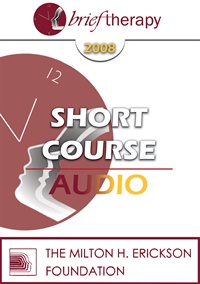
- Average Rating:
- Not yet rated
- Topic Areas:
- Short Courses | Ericksonian Hypnosis and Therapy Techniques | Supervision | Brief Therapy | Resistance
- Categories:
- Brief Therapy Conference | Brief Therapy Conference 2008
- Faculty:
- Dale Bertram, PhD | Mike Rankin, LMFT
- Duration:
- 1:24:49
- Format:
- Audio Only
- Original Program Date:
- Dec 11, 2008
- Short Description:
- Supervision can become a powerful training ground when challenges are utilized rather than avoided. In this practical workshop, Bertram and Rankin demonstrate how Ericksonian principles, especially utilization, indirection, and reframing, can transform difficult supervision dilemmas into opportunities for growth. Through rich case vignettes and audience dialogue, they explore confidentiality breaches, resistance, mental health concerns, and dishonesty, offering a flexible, humane framework for building clinical competence and ethical clarity.
- Price:
- $15.00 - Base Price
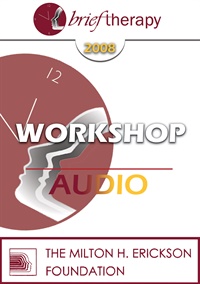
- Average Rating:
- Not yet rated
- Topic Areas:
- Workshops | Children and Adolescent Therapy | Brief Therapy | Meditation, Spirituality and Yoga | Mindfulness | Strengths-Based
- Categories:
- Brief Therapy Conference | Brief Therapy Conference 2008
- Faculty:
- Matthew Selekman, MSW
- Duration:
- 2:34:38
- Format:
- Audio Only
- Original Program Date:
- Dec 11, 2008
- Short Description:
- Adolescent self-harming behavior is on the rise and is one of the most challenging presenting problems school professionals, healthcare providers, and therapists will face in their clinical practice settings. In this "hands-on" practice-oriented workshop, participants will learn several distress management tools and strategies to strengthen the adolescent's self-soothing and coping capacities and family connection building rituals and therapeutic experiments to foster closer and stronger parent-adolescent relationships. Parent management skills for constructively responding to their adolescents' inevitable self-harming slips will be presented.
- Price:
- $15.00 - Base Price
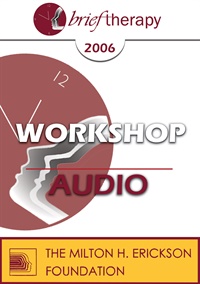
- Average Rating:
- Not yet rated
- Topic Areas:
- Workshops | Children and Adolescent Therapy | Abuse | Brief Therapy | Family Therapy | Strengths-Based
- Categories:
- Brief Therapy Conference | Brief Therapy Conference 2006
- Faculty:
- Matthew Selekman, MSW
- Duration:
- 2:30:03
- Format:
- Audio Only
- Original Program Date:
- Dec 09, 2006
- Short Description:
- Adolescent self-harming behavior is on the rise and one of the most challenging presenting problems therapists will face today in their clinical practice settings. Therapists referred these clients are often intimidated by their cutting and burning behaviors, the DSM IV labels they have been given, and the army of helping professionals involved with them and their families. many of these adolescents have experienced multiple treatment failures, feel emotionally disconnected from their parents, and come from families where there may be difficulties with marital or post-divorce conflicts, invalidating family interactions, gender power imbalance issues, or family secrets. In this hands-on, practice-oriented workshop, participants will learn a collaborative, strengths-based therapy approach that capitalizes on the strengths and resources of the adolescent, family members, concerned peers, adult inspirational others, and involved helpers from larger systems to rapidly co-construct solutions
- Price:
- $15.00 - Base Price
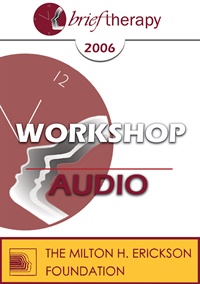
- Average Rating:
- Not yet rated
- Topic Areas:
- Workshops | Brief Therapy | Family Therapy | Multicultural | Cultural and Social Contexts
- Categories:
- Brief Therapy Conference | Brief Therapy Conference 2006
- Faculty:
- Patricia Arredondo, EdD
- Duration:
- 2:26:53
- Format:
- Audio Only
- Original Program Date:
- Dec 09, 2006
- Short Description:
- This session offers a grounded, experience-near look at working clinically with contemporary Latino families. Through cultural frameworks, lived examples, and extended case vignettes, participants explore values such as familismo, personalismo, respeto, machismo, and marianismo, alongside the real pressures of immigration, acculturation, gender roles, and shame. The work invites therapists to move beyond stereotypes, recognize strengths, and respond with cultural humility, practical strategies, and deeper attunement to family and generational dynamics in therapy.
- Price:
- $15.00 - Base Price
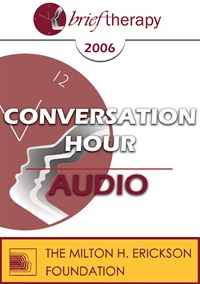
- Average Rating:
- Not yet rated
- Topic Areas:
- Conversation Hours | Children and Adolescent Therapy | Family Therapy | Brief Therapy | Strengths-Based
- Categories:
- Brief Therapy Conference | Brief Therapy Conference 2006
- Faculty:
- Matthew Selekman, MSW
- Duration:
- 1:00:49
- Format:
- Audio Only
- Original Program Date:
- Dec 08, 2006
- Short Description:
- BT06 Conversation Hour 02 - Collaborative, Strengths-Based Therapy with Self-Harming Adolescents & Their Families - Matthew Selekman, MSW
- Price:
- $15.00 - Base Price
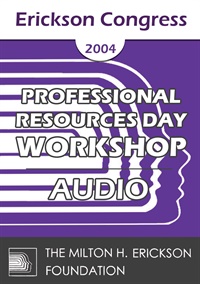
- Average Rating:
- Not yet rated
- Topic Areas:
- Workshops | Positive Psychology | Therapist Development | Happiness | Self-Care
- Categories:
- Erickson Congress | Erickson Congress 2004
- Faculty:
- George Burns, MA, PsS
- Duration:
- 1:40:00
- Format:
- Audio Only
- Original Program Date:
- Dec 01, 2004
- Short Description:
- Burns explores how positive psychology and Ericksonian principles intersect in everyday clinical practice. Through interactive exercises, case examples, and sensory-based tools such as the “happiness inventory,” he demonstrates how therapists can cultivate flourishing in themselves and their clients by expanding awareness, choice, connection, and meaning. Blending research on flow, neuroplasticity, compassion, and community with vivid stories from cross-cultural experience, the session offers practical strategies for building well-being rather than focusing solely on pathology.
- Price:
- $15.00 - Base Price
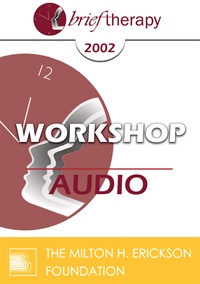
- Average Rating:
- Not yet rated
- Topic Areas:
- Workshops | Children and Adolescent Therapy | Communication | Brief Therapy
- Categories:
- Brief Therapy Conference | Brief Therapy Conference 2002
- Faculty:
- Insoo Kim Berg, MSSW
- Duration:
- 2:12:52
- Format:
- Audio Only
- Original Program Date:
- Dec 15, 2002
- Short Description:
- Working with children calls for a different kind of listening. In this lively workshop, Berg demonstrates how solution-focused principles translate into play, scaling tools, compliments, family sessions, and creative exercises that engage even very young clients. Through vivid case examples, she shows how to involve parents, shift attention to strengths, and use simple materials to help children articulate solutions in their own language.
- Price:
- $15.00 - Base Price
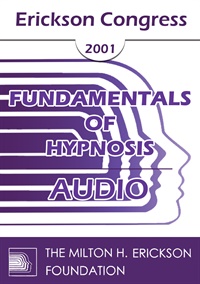
- Average Rating:
- Not yet rated
- Topic Areas:
- Fundamentals of Hypnosis | Hypnosis | Ericksonian Hypnosis and Therapy Techniques
- Categories:
- Erickson Congress 2001 | Erickson Congress
- Faculty:
- Michael Yapko, PhD
- Duration:
- 1:26:46
- Format:
- Audio Only
- Original Program Date:
- Dec 08, 2001
- Short Description:
- This session explores how hypnosis can enhance goal-oriented therapy by helping clients move from problems to tangible solutions. Participants learn to use hypnotic principles like focused attention, dissociation, and suggestion to amplify useful experiences, access inner resources, and build new skills. The session offers practical ways to structure sessions that make change more achievable, meaningful, and lasting.
- Price:
- $15.00 - Base Price
- Average Rating:
- Not yet rated
- Topic Areas:
- Clinical Demonstrations | Resources | Ericksonian Hypnosis and Therapy Techniques
- Categories:
- Erickson Congress | Erickson Congress 1994
- Faculty:
- Michael Yapko, PhD
- Course Levels:
- Master Degree or Higher in Health-Related Field
- Duration:
- 54:49
- Format:
- Audio and Video
- Original Program Date:
- Dec 10, 1994
- Short Description:
- This clinical demonstration uses hypnosis to help a client access inner resources and self-trust while navigating anxiety and uncertainty. Through age regression, metaphor, and guided exploration, the session connects early experiences of curiosity and discovery to present challenges, showing how empowerment arises from embracing the unknown. Participants observe how hypnosis fosters self-awareness, resilience, and confidence in managing life’s unpredictability with courage and balance.
- Price:
-
Sale is $29.00
price reduced from Base Price - $59.00
- Average Rating:
- Not yet rated
- Topic Areas:
- Clinical Demonstrations | Hypnosis | Resources
- Categories:
- Brief Therapy Conference | Brief Therapy Conference 1993
- Faculty:
- Michael Yapko, PhD
- Course Levels:
- Master Degree or Higher in Health-Related Field
- Duration:
- 51:14
- Format:
- Audio and Video
- Original Program Date:
- Dec 11, 1993
- Short Description:
- In this demonstration, hypnosis becomes a bridge to personal strengths as a new mother struggling with sadness reconnects with empowering childhood memories. Through age regression and guided recall, she discovers how past experiences of joy and mastery can inform her parenting with greater confidence and wisdom. The session illustrates how hypnosis helps clients access internal resources and reframe challenges without imposing outside interpretations.
- Price:
-
Sale is $29.00
price reduced from Base Price - $59.00


